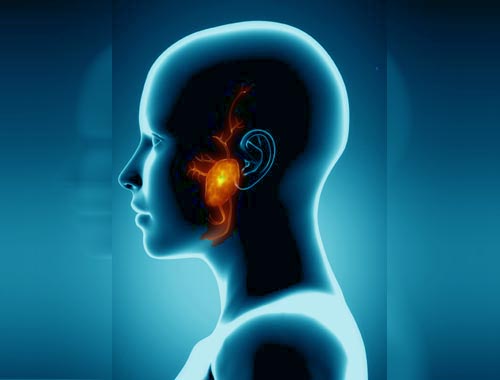Mumps (Parotitis)

Published: 18 Jun 2025
ICD9: 527.1 ICD10: K11.1 ICD11: 1D80
Mumps (Parotitis) is a contagious viral disease caused by the mumps virus.
It's best known for causing painful swelling of the salivary glands, especially the parotid glands (located on either side of your face, near your ears).
Here's a breakdown:
![]() Cause: Mumps virus
Cause: Mumps virus
![]() Transmission: Spread through respiratory droplets (saliva, mucus) when an infected person coughs, sneezes, talks, shares utensils, or touches surfaces that are then touched by others.
Transmission: Spread through respiratory droplets (saliva, mucus) when an infected person coughs, sneezes, talks, shares utensils, or touches surfaces that are then touched by others.
![]() Symptoms:
Symptoms:![]()

![]() Swollen, painful salivary glands: This is the hallmark symptom, often affecting the parotid glands (one or both sides). The swelling can make it difficult to chew or swallow.
Swollen, painful salivary glands: This is the hallmark symptom, often affecting the parotid glands (one or both sides). The swelling can make it difficult to chew or swallow.![]()

![]() Fever: Often mild to moderate.
Fever: Often mild to moderate.![]()

![]() Headache
Headache![]()

![]() Muscle aches
Muscle aches![]()

![]() Fatigue
Fatigue![]()

![]() Loss of appetite
Loss of appetite![]()

![]() General feeling of being unwell (malaise)
General feeling of being unwell (malaise)
![]() Incubation period: Typically 16-18 days (range: 12-25 days) from exposure to the onset of symptoms. People are generally contagious from a few days before symptoms start until a few days after the swelling subsides.
Incubation period: Typically 16-18 days (range: 12-25 days) from exposure to the onset of symptoms. People are generally contagious from a few days before symptoms start until a few days after the swelling subsides.
![]() Complications: While usually mild, mumps can sometimes lead to more serious complications, especially in adults. These include:
Complications: While usually mild, mumps can sometimes lead to more serious complications, especially in adults. These include:![]()

![]() Orchitis: Inflammation of the testicles (in males who have reached puberty). Can cause pain, swelling, and rarely, infertility.
Orchitis: Inflammation of the testicles (in males who have reached puberty). Can cause pain, swelling, and rarely, infertility.![]()

![]() Oophoritis: Inflammation of the ovaries (in females).
Oophoritis: Inflammation of the ovaries (in females).![]()

![]() Meningitis: Inflammation of the membranes surrounding the brain and spinal cord.
Meningitis: Inflammation of the membranes surrounding the brain and spinal cord.![]()

![]() Encephalitis: Inflammation of the brain.
Encephalitis: Inflammation of the brain.![]()

![]() Pancreatitis: Inflammation of the pancreas.
Pancreatitis: Inflammation of the pancreas.![]()

![]() Hearing loss: Rarely, mumps can cause permanent hearing loss.
Hearing loss: Rarely, mumps can cause permanent hearing loss.![]()

![]() Miscarriage: In pregnant women, mumps can increase the risk of miscarriage, especially during the first trimester.
Miscarriage: In pregnant women, mumps can increase the risk of miscarriage, especially during the first trimester.
![]() Diagnosis: Usually diagnosed based on clinical symptoms (especially parotid gland swelling). Lab tests (blood, saliva, or urine) can confirm the diagnosis, especially in cases where the symptoms are atypical.
Diagnosis: Usually diagnosed based on clinical symptoms (especially parotid gland swelling). Lab tests (blood, saliva, or urine) can confirm the diagnosis, especially in cases where the symptoms are atypical.
![]() Treatment: There is no specific antiviral treatment for mumps. Treatment focuses on relieving symptoms:
Treatment: There is no specific antiviral treatment for mumps. Treatment focuses on relieving symptoms:![]()

![]() Rest
Rest![]()

![]() Pain relievers: Over-the-counter medications like acetaminophen (Tylenol) or ibuprofen (Advil, Motrin) can help with fever and pain. *Never give aspirin to children due to the risk of Reye's syndrome.*
Pain relievers: Over-the-counter medications like acetaminophen (Tylenol) or ibuprofen (Advil, Motrin) can help with fever and pain. *Never give aspirin to children due to the risk of Reye's syndrome.*![]()

![]() Fluids: To prevent dehydration.
Fluids: To prevent dehydration.![]()

![]() Soft foods: Because chewing can be painful.
Soft foods: Because chewing can be painful.![]()

![]() Avoid acidic foods or drinks: These can irritate the salivary glands.
Avoid acidic foods or drinks: These can irritate the salivary glands.![]()

![]() Ice packs: To relieve swelling and pain.
Ice packs: To relieve swelling and pain.
![]() Prevention: The MMR (measles, mumps, rubella) vaccine is highly effective in preventing mumps. Two doses are recommended for children:
Prevention: The MMR (measles, mumps, rubella) vaccine is highly effective in preventing mumps. Two doses are recommended for children:![]()

![]() First dose: 12-15 months of age
First dose: 12-15 months of age![]()

![]() Second dose: 4-6 years of age
Second dose: 4-6 years of age
Adults who have not had mumps or the MMR vaccine should also get vaccinated.
![]() Isolation: People with mumps should stay home from school or work until they are no longer contagious (typically about 5 days after the onset of parotid swelling). This helps prevent the spread of the virus.
Isolation: People with mumps should stay home from school or work until they are no longer contagious (typically about 5 days after the onset of parotid swelling). This helps prevent the spread of the virus.
In summary: Mumps is a preventable viral illness characterized by swelling of the salivary glands. While usually mild, it can sometimes lead to complications. Vaccination is the best way to protect yourself and others from mumps. If you suspect you or someone you know has mumps, it's important to see a doctor.